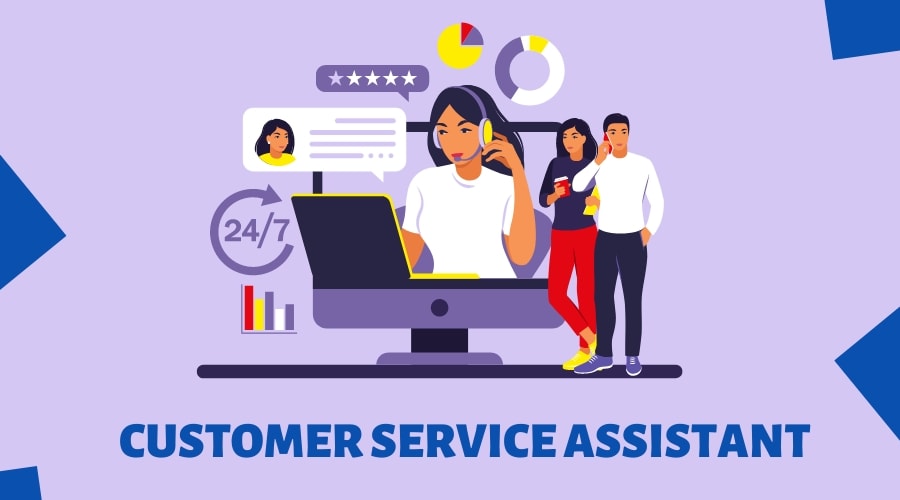In today’s customer-centric business landscape, the role of a customer service assistant is more critical than ever before. With the rise of online reviews and social media, a single negative customer experience can quickly go viral and damage a company’s reputation. As a result, employers are seeking candidates who possess a specific set of skills to excel in this role. This blog post will explore the essential skills needed to be a successful customer service assistant and provide tips on developing and showcasing these skills to potential employers.
1. Strong Communication Skills
Active Listening: Active listening involves fully concentrating on what the customer is saying without interrupting or making assumptions. This allows you to comprehend their concerns or questions accurately and respond appropriately. It also shows the customer that you value their input and are committed to resolving their issues.
Verbal Communication: Customer service assistants must express themselves clearly and concisely when speaking with customers. They should use simple and easily understandable language, avoiding technical jargon or complex terms that may confuse customers. Maintaining a friendly and professional tone is essential in building customer rapport and trust.
Written Communication: Along with verbal communication, strong written communication skills are essential for customer service assistants. This includes writing clear and concise emails, chat messages, or social media responses to customers. It is essential to use proper grammar, punctuation, and spelling to create a professional image for the company.
Empathy and Emotional Intelligence: Empathy is the ability to understand and share the feelings of others. Customer service assistants should be able to empathize with customers who may be frustrated, upset, or confused. By showing empathy, you can build trust, diffuse tense situations, and find appropriate solutions to meet the customer’s needs.
Conflict Resolution: Handling customer complaints or conflicts effectively is vital for a customer service assistant. This involves remaining calm, listening to the customer’s concerns, and finding a solution that satisfies both the customer and the company. Practical conflict resolution skills can turn a negative customer experience into a positive one and help retain customer loyalty.
2. Empathy and Patience
Empathy: Empathy is the ability to understand and share the feelings of others. Customer service means putting yourself in the customer’s shoes and understanding their emotions and frustrations. When customers reach out with complaints or issues, showing empathy can help create a sense of understanding and trust. Acknowledging their feelings and demonstrating that you care about their experience can build a stronger rapport with customers and improve their overall satisfaction.
Patience: Patience is vital in customer service, as it lets you handle difficult situations and challenge customers with composure. Some customers may be angry, upset, or confused, and staying calm and patient throughout the interaction is essential. Patience enables you to actively listen to the customer’s concerns, ask clarifying questions, and provide appropriate solutions. It also helps manage customer expectations and navigate complex or time-consuming issues. By practicing patience, you can prevent the escalation of conflicts and maintain a positive and professional demeanour.
3. Problem-Solving Abilities
Analytical Thinking: Customer service assistants must possess analytical thinking skills to assess customer concerns and identify the root cause of the problem. By analyzing the situation and gathering relevant information, they can develop practical solutions and address the underlying issue rather than merely treating the symptoms. Analytical thinking involves breaking down complex problems, evaluating multiple perspectives, and making informed decisions.
Creative Solutioning: Some customer issues require creative solutions beyond standard procedures. Customer service assistants with solid problem-solving abilities can think outside the box and develop innovative approaches to address unique challenges. By offering creative solutions, they can exceed customer expectations and provide tailored responses.
Decision-Making: Problem-solving often involves making decisions under pressure. To make well-informed decisions, customer service assistants must consider various factors, including company policies, customer needs, and business objectives. Practical decision-making skills enable them to weigh the pros and cons, evaluate potential risks, and select the most appropriate action.
Adaptability: Customer service assistants encounter diverse customer requests and problems daily. They must be adaptable and flexible in their problem-solving approach, as different situations may require different strategies. Adaptable individuals can quickly adjust their problem-solving techniques and adopt alternative solutions to meet changing customer needs.
Collaboration: Problem-solving is often a collaborative effort. Customer service assistants must work closely with their colleagues, supervisors, and other departments to find comprehensive solutions. Collaborative problem-solving involves effective communication, active listening, and integrating diverse perspectives. By collaborating with others, customer service assistants can tap into a broader range of knowledge and expertise, leading to more effective problem resolution.
4. Product and Service Knowledge
Building Credibility: Customers rely on customer service assistants to provide accurate information about products and services. When customer service assistants have in-depth knowledge, they can confidently address customer inquiries and build credibility. Providing accurate and detailed information instils trust in customers and enhances the overall customer experience.
Answering Queries: Customers often have specific questions about products and services. Customer service assistants with product and service knowledge can quickly and effectively answer these queries. They can provide detailed explanations, highlight critical features, and offer suggestions based on customer needs. Such comprehensive responses resolve customer queries and contribute to upselling and cross-selling opportunities.
Troubleshooting Assistance: Customers may encounter issues or difficulties while using products or services. Customer service assistants with in-depth knowledge can guide customers through troubleshooting procedures. They can provide step-by-step instructions, identify potential causes of the problem, and help customers resolve issues efficiently. By offering practical troubleshooting assistance, customer service assistants contribute to customer satisfaction and retention.
Promoting Offerings: Customer service assistants play a vital role in promoting products and services. With specific product and service knowledge, they can highlight the unique selling points, explain benefits, and address customer concerns or objections. Customer service assistants contribute to sales growth and business success by effectively promoting offerings.
5. Time Management and Organization
Prioritizing Tasks: Customer service assistants often have to handle multiple tasks simultaneously, such as answering customer inquiries, resolving issues, and processing orders. Practical time management skills allow them to prioritize tasks based on urgency and importance. By prioritizing tasks, customer service assistants can ensure that critical customer needs are addressed promptly and efficiently.
Meeting Deadlines: Deadlines are expected in customer service, whether responding to customer inquiries within a specific timeframe or fulfilling service requests within a specified timeframe. Customer service assistants with good time management skills can meet these deadlines consistently, ensuring that customers receive prompt and reliable service.
Handling High Volume: Customer service assistants may experience high call or email volumes, especially during peak times or promotional events. Efficient time management skills allow them to allocate sufficient time and resources to handle the increased workload without compromising the quality of service. Customer service assistants maintain service efficiency and meet customer expectations by managing high volumes effectively.
Documenting Customer Interactions: Keeping track of customer interactions, including inquiries, complaints, and resolutions, is essential for maintaining accurate records and providing personalized service. Organizational skills enable customer service assistants to document and retrieve customer information quickly, ensuring that relevant details are readily available when needed.
Multitasking: Customer service often requires multitasking, as customer inquiries and requests can arise simultaneously. Customer service assistants with solid time management skills can effectively handle multiple tasks at once, such as responding to emails while handling phone calls. Customer service assistants maximize productivity and ensure efficient service delivery by multitasking efficiently.
Using Productivity Tools: Utilize productivity tools such as task management apps or project management software to organize and prioritize tasks. These tools help customer service assistants track progress, set reminders, and manage their time effectively.
Establishing Routines: Establish a daily routine to allocate specific time slots for different tasks, such as responding to emails, making phone calls, or documenting customer interactions. Following a routine helps customer service assistants stay organized and promptly address all tasks.
Delegating and Collaborating: Delegate tasks to team members or collaborate with colleagues to share the workload. Effective delegation and collaboration help distribute tasks evenly and prevent overload, enabling customer service assistants to manage their time more efficiently.
Time Blocking: Implement the time blocking technique by allocating dedicated time blocks for specific tasks. This approach helps customer service assistants focus on one task at a time and avoid distractions, resulting in increased productivity and improved time management.
Continuous Improvement: Continuously seek opportunities to improve time management and organizational skills by attending workshops, training programs, or webinars focused on these areas. Learning new techniques and strategies can optimize productivity and enhance efficiency in customer service.







